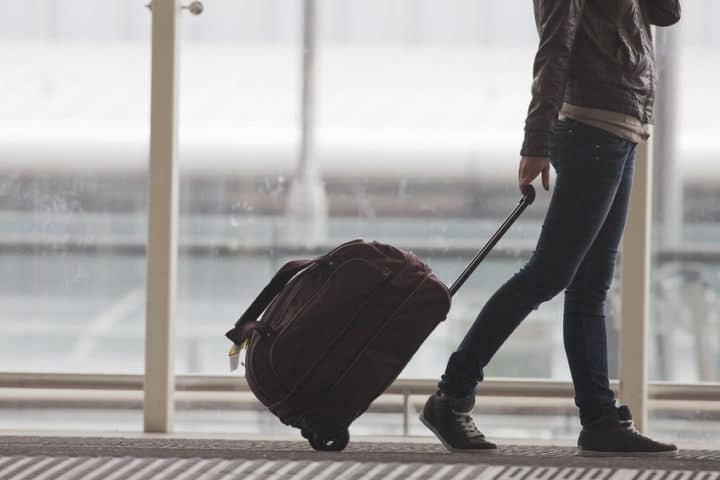Traveling with adrenal fatigue can be a grueling experience. When your default mode is already ‘exhaustion’, the prospect of a lengthy trip is enough to strike dread into any sane human being.
Traffic delays, sitting for hours in an unnatural, air conditioned environment, exposure to germs from other passengers – the list of stressors is endless. The reality is that there’s a lot that’s beyond your control when you’re faced with a long journey. But, with a little organization, you can arrive at your destination feeling refreshed and ready to go.
Here are some of my top tips for avoiding complete meltdown when traveling with adrenal fatigue.
Choose the right luggage
One of the most stressful parts of any journey isn’t just ensuring you arrive at your destination, but that your luggage does too. Your strategies will depend on which mode of transport you intend to use.
For example, if you’re traveling by train, try to book tickets that are near to storage holders so you don’t have to carry heavy bags any further than is absolutely necessary. Being seated where you can see your bags is also reassuring. There’s nothing worse than spending a three hour train journey fretting over whether or not your luggage will arrive damage free, or if it will even be in the rack when it’s time to disembark.
When choosing a suitable travel bag, try to avoid bringing anything with complicated straps that will dig into your hands or back, and most of all, be sure that it’s relatively light to carry. If you’re one of those people that find it impossible to travel light and simply can’t leave home without the kitchen sink, opt for a suitcase with wheels. Choose luggage where the wheels go all directions so you can easily maneuver it, and make sure it’s a comfortable weight to lift in the event that you have to navigate steps en-route to your destination.
For added security, label all bags clearly so they’re distinguishable from those belonging to other travellers. A good tip is to use colourful luggage stickers to avoid mix-ups during the journey. Check out Ebay, Etsy and Amazon for affordable, personalized tags or bright stickers that will make your bags easily recognizable and stand out from the crowd.
My top tip however, is to be sure to carry all your personal necessities in a light travel hand bag. Ensure you have:
- A healthy snack to avoid caving in to the over-priced, low nutrient airport / station junk food. Pack some boiled eggs, homemade protein cookies, dry packs of rolled oats with nuts or granola (just add hot water or milk), trail mix, or cheese and chopped vegetables. Make sure you have enough healthy snacks so you aren’t tempted by all the junk food or caught out by a possible unpalatable meal on the plane.
- Anti-bacterial wipes to freshen your hands and face, or to wipe down any germ ridden surfaces such as travel tables and toilet seats
- Any important travel documents you need to have to hand, and of course always carry your ID. This might sound like I’m stating the obvious, but in the event your luggage goes missing, then so do your documents
- Any medications / herbal remedies / essential oil sprays you might need to get you through the journey. Lavender pulse point roller balls can be a life-saver when journeys take longer than anticipated
- Remember to think ahead – for example, will you need spare change for parking?
Circadian rhythms
Long flights are a nightmare for people with adrenal fatigue, not least because travelling through time zones can play havoc with your circadian rhythms.
Before you travel, take a day or two to make sure that you’re fully rested. If this means taking a few days off work or breaking your regular routine then so be it. If at all possible, try to book flights that are scheduled to arrive during daylight hours. Studies show that this can help with adjusting to a new routine and can reduce the symptoms of jet-lag.
Avoid stimulants
An ice cold G&T might sound like just the ticket if you’re heading off on holidays, or if you just want to steady frayed nerves on a trip. However, any stimulant (including coffee, energy drinks and cigarettes) are a bad idea when travelling, especially if your sleep routine is already disrupted.
It can be hard to stay hydrated while traveling. Wherever possible, opt for water over alcohol so you’re not giving your adrenals extra work to do on top of managing the additional stress caused by the journey.
Don’t go it alone!
Traveling with a supportive partner can really be a godsend if you want to avoid a full blown adrenal crash. Travelling with a companion means you’ll have someone to wait in the check-in line, calm your nerves if you start to feel stressed, and basically help deal with the other million and one possible hiccups that can occur when travelling over longer distances. However, out of consideration for your travel buddy, always be sure that they’re aware of your health needs before you leave so they don’t feel overwhelmed if you have sudden slumps in energy or need additional support during your trip.
Take-away:
Remember, travelling is stressful for everyone regardless of whether or not they have adrenal fatigue. The key, as always, is preparation. Plan ahead, and don’t be too hard on yourself if you find yourself struggling during the journey. Be sure to plan restful activities for when you arrive, a sauna, an early night, a leisurely meal… Allow your body time to adjust and congratulate yourself for not letting adrenal fatigue dictate your routine!




Leave a Reply